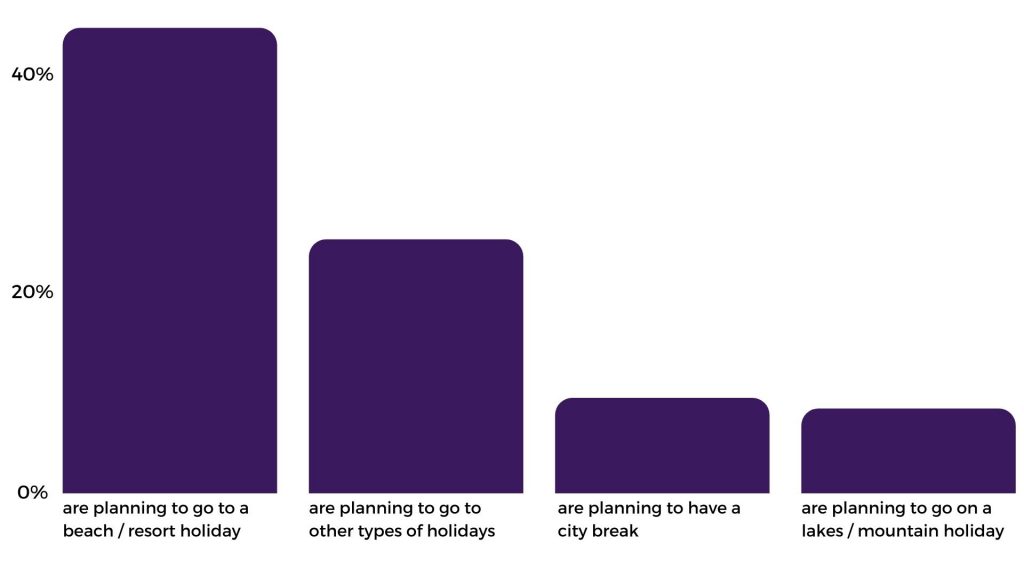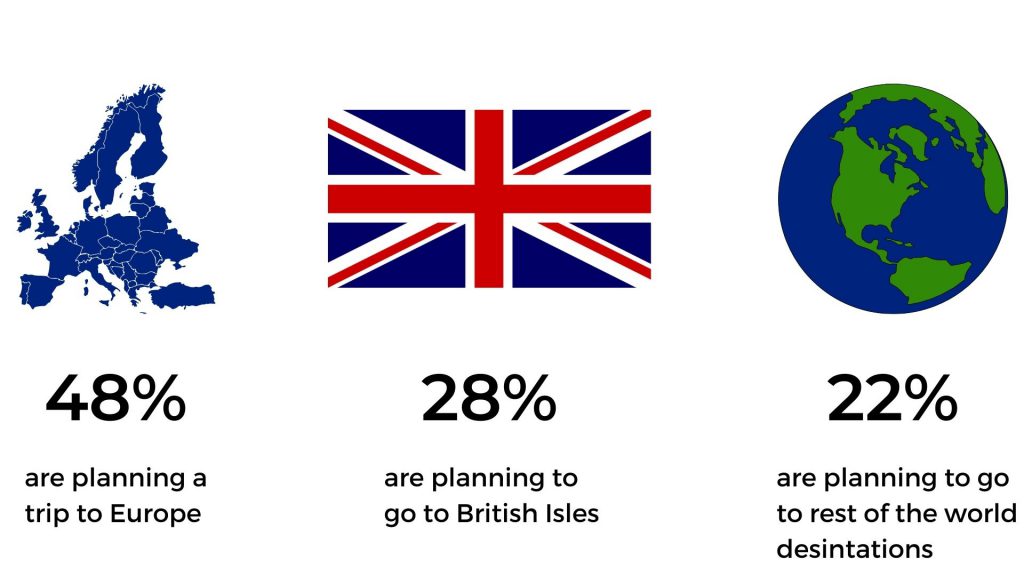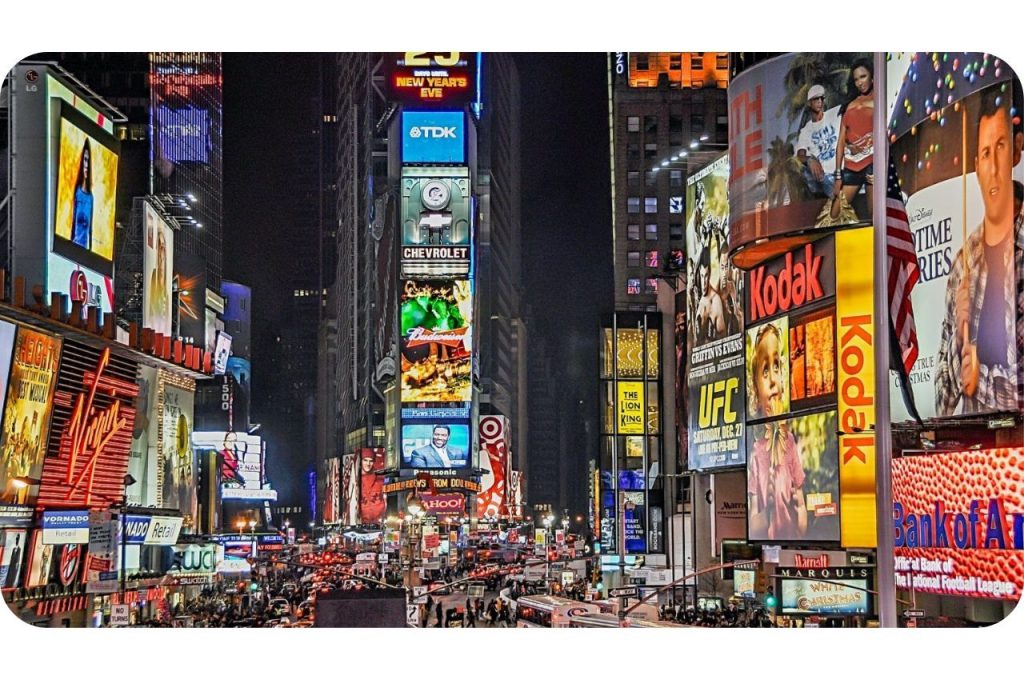
The travel sector is one of many that has faced challenges and increased pressure since the start of the pandemic. With uncertainties around the safety of travelling and no guarantee whether a trip will go ahead, there has inevitably been a shift in attitudes towards travelling abroad over the past few years.
Due to a lack of clarity around the impact of the Omicron variant; travel companies remain unsure on whether or not consumers will still be booking trips.
New data from TGI reveals that 16% of adults (8 million people) have already booked a main holiday for 2022, whilst 20% (11 million) plan to book one at some point in 2022 and 65% (34 million) are currently still uncertain about doing so.
Who is travelling and where are they going?
Despite uncertainties, many people are still planning to travel in 2022 and almost half of those consumers say that they plan to have a beach holiday.
This is quite a significant increase (+28%) in comparison to beach holidays in 2021. 44% of GB holiday-goers in 2022 are planning to travel to a beach/resort holiday, whilst just 9% are planning to have a city break.
Those aged 35-44 are 35% more likely to consider a city break than the average GB adult. The younger demographic are looking forward to a summer holiday, with 31% of those planning to go on a beach holiday being between ages 15-34.
Types of holiday GB holiday-goers are planning to take:

Almost half (48%) of adults who are planning to go abroad will visit Europe, and some are planning on travelling further afield after being restricted:
Out of those who are planning holidays:

Last minute trips could be on the rise as people are hesitant to book in advance. Those planning a holiday in British Isles are very likely (96%) to book their holiday just one week ahead.
FEATURED READS
People are willing to spend more
The good news for travel companies, is that it seems those that are travelling are also more willing to ‘splash out’ on their 2022 holiday. This is probably the result of being restricted for such a long time during the pandemic. Out of the 36% of adults who have booked a holiday or intend on doing so, many of them agree that they would increase their budgets this year.
A third of the 6 million people intending to book a holiday or who have already booked, plan to spend more on at least one aspect of the trip:
- 19% (3.6 million people) plan to spend more this year on the destination they go to, whilst only 1% intend to spend less.
- 13% (2.4 million people) say they are happy to spend more on accommodation, compared to just 2% who want to spend less.
- 13% of people are planning to spend more on their length of stay.
Some consumers may be willing to spend more on their trips due to saving money during the lockdown, with 48% of ‘pandemic savers’ saving over £1,000 and 19% saving £4,000 or more (Source: YouGov)
Despite increases in spend on the trip itself, it seems some holiday-goers or those planning a trip, would spend less on the run-up to their holiday:
- 10% plan to spend less on beauty treatments before going away.
- 9% would spend less on clothes and accessories for the trip.
- 8% would spend less on cosmetics/toiletries.
FEATURED READS
How can brands reach the holiday-goers with higher budgets?
For travel companies, targeting those consumers that are willing to spend more could be key in future campaigns. TGI reveal that these people are more likely than the average GB adult to be influenced by advertising in general, plus:
- Those who are open to ‘splashing out’ for their 2022 trips are more likely to be influenced by a celebrity.
- They are particularly likely to be consumers of cinema and social media.
All Response Media viewpoint

“We have certainly seen active sentiment for travel grow significantly over the past 3 months aligned with the easing of restrictions even though it is still tracking some 20% below where it was in January 2020 before the pandemic began. It’s also suffice to say that those who are searching are taking longer to book/commit and those who are booking insist on flexibility. Consumers are optimistic, but cautious…”
Liam Cronin
Director
The scars of the last 2 years will still take some time to heal and the inertia caused by uncertainty is likely to linger with many airlines, tour operators and DMOs expecting ‘normal’ to be a 3-5 year timeline.
However, those who are booking and travelling are certainly travelling farther afield and spending more. Two years of staying at home has meant that consumers have the desire and the finances to plan and pay for that ‘once in a lifetime’ trip which in many ways carries less risk than planning multiple smaller holidays.
It is critical for travel advertisers to account for these changes in consumer perception and behaviour to ensure ROAS goals are met and exceeded in 2022 and beyond.
- Phasing – with consumers booking later, the traditional January booking window is greatly reduced. Adopting an ‘always-on’ approach to your advertising budget will help to meet demand as it picks up throughout the year.
- Channels – TV and digital offer the flexibility to increase/decrease budgets to take advantage of opportunities
and combat any threats whilst at the same time allowing advertisers to inspire an audience that is hungry for adventure.
- Messaging – Offer assurances around flexibility. Plans are constantly in flux and may continue to be in the short term at least.
- Help consumers to make sense of any restrictions or issues they may face. The regulatory landscape has become much more complex and confusion breeds inertia.
- Sustainable/ethical travel is one of the by-products of the pandemic and it is here to stay. Buoyed by the reduction in emissions and the outcomes of COP26, consumers are more environmentally conscious than they ever have been.








